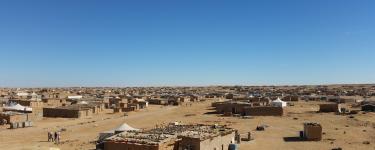Western Sahara: Resistance in exile

Deep in the Sahara desert, some 165,000 Saharawi refugees cling to the hope that they will one day return to their confiscated homeland. Temperatures range from the scorching to the freezing, water is scarce, access to the outside world is difficult. The people of Western Sahara have been forced to live here, struggling to return to a homeland where they can determine their own future.
But despite a lifetime in exile, and denial of their basic human rights, resistance is growing.
On 31 October 1975, Morocco and Mauritania invaded Western Sahara as Spain (the former colonial power) looked on. The indigenous Saharawi people were expelled from their homes by force. Most fled to the Algerian desert. Ever since, the Saharawi people have been denied the right to self-determination, and mass migration of Moroccan settlers has turned them into a minority in their own land.
Mauritania withdrew its claim to Western Sahara in 1979 and left. But Morocco stayed. The Saharawi people declared their own Republic in exile, which is now recognised by 60 other states. Yet the world still refuses to uphold international law and bring the Occupation to an end.
Lucrative colony
As Morocco continues to plunder the rich supply of natural resources that belong to the Saharawi people, such as fish stocks and phosphate (a crucial component in fertilizer), it uses its financial and diplomatic means to further cement its hold on to its lucrative colony.
Foreign oil investment continues to boost Morocco’s frail veneer of international legitimacy and finances the expensive occupation, while its recent readmission to the African Union, having left in 1984, has served to embolden the regime.
'The Devil's Garden'
The Saharawi refugee camps are located near the city of Tindouf in the Algerian desert. Here the terrain is harsh and temperatures can top 50°C in the summer months. It’s clear why this stretch of desert is known to some as ‘The Devil’s Garden’.
What is also evident is the lack of any productive or income-generating activities, which entrenches poverty and further deepens the dependence on international aid.
Yet, despite a lifetime in exile, resistance is growing.
Protests against plunder
War on Want partner the Saharawi Campaign Against the Plunder (SCAP) is working tirelessly to raise awareness among Saharawis in the refugee camps, and occupied territories, about the ongoing illegal plunder of Western Sahara’s resources and its impact on the conflict. SCAP is organising presentations in camps and protests against the companies exploiting Saharawi resources.
They mobilised an incredible 4,000 people to protest against the Irish company San Leon Energy, which is exploring for oil near El-Aiun, the occupied capital of Western Sahara.
Building resistance
Jalihena from the Saharawi Campaign Against the Plunder (SCAP) is categorical: "As long as the Moroccan monarchy continues to benefit, without impunity, from the plunder of Saharawi natural resources, it will not be pressured to give up the territories it occupies and will make the Saharawi efforts to liberate the territories even harder."
The conflict is keeping so many people in poverty. War on Want will continue to support our Saharawi partners by helping raise awareness of the struggle, in order to build resistance and bring the occupation to an end.
We urge the UK government to:
- press the Moroccan government to accept international law and repeated UN Security Council resolutions enabling the Saharawi people to vote on the independence of Western Sahara
- press the Moroccan government to respect human rights in the occupied territories of Western Sahara
- provide a clear and positive lead in the UN Security Council in support of the right of the Saharawi people to self-determination
- stop all arms sales to Morocco, until there is a sustainable peace agreement for Western Sahara.



